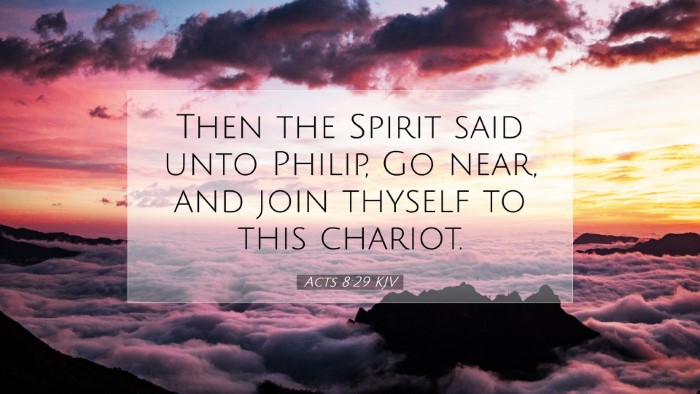Acts 8:29 Commentary
Verse: "Then the Spirit said unto Philip, Go near, and join thyself to this chariot."
Introduction
Acts 8:29 presents a pivotal moment in the early Church's expansion beyond its Jewish roots. This verse captures the divine orchestration in the life of Philip, one of the most significant figures in the early evangelistic efforts, showcasing the guidance of the Holy Spirit.
Contextual Background
This passage occurs in the larger narrative of Acts, where the apostles are propelled by the Holy Spirit to spread the gospel. Philip, following the martyrdom of Stephen, has been actively evangelizing in Samaria and performing miracles. This particular encounter with the Ethiopian eunuch serves to highlight God's sovereign plan to reach individuals and nations for the Gospel.
Insights from Public Domain Commentaries
Matthew Henry's Commentary
Matthew Henry emphasizes the importance of divine direction in the life of believers, as seen in Philip's readiness to follow the Spirit's prompting. He observes that the Spirit directed Philip to a solitary situation where he could effectively minister. Henry notes that this passage reflects God's concern for individuals, not merely for masses, illustrating the personal nature of divine interaction.
Albert Barnes' Notes on the Bible
Albert Barnes discusses the nature of the communication from the Spirit to Philip, emphasizing that the guidance was not general, but specific. Barnes elucidates that the term "join thyself" implies more than mere proximity; it calls for an active engagement. He further highlights the chariot's symbolic representation of worldly power and prestige, indicating that the Gospel is accessible to all, regardless of social status.
Adam Clarke's Commentary
Adam Clarke provides insights into the socio-cultural context of the Ethiopian eunuch, emphasizing his high-ranking position and the significance of his pilgrimage to Jerusalem. Clarke posits that the eunuch's openness to the Scriptures and his search for truth positioned him as a prime candidate for divine encounter. He highlights the celestial orchestration of Philip's journey as a demonstration of God’s providential plan.
Theological Themes
-
Divine Guidance: The directive to Philip serves as a reminder for all believers about the necessity of seeking and being responsive to the Holy Spirit's leading in their lives.
-
Accessibility of the Gospel: Philip's ministry to the Ethiopian eunuch signifies that the Gospel transcends societal and cultural boundaries, urging the Church to remain inclusive and approachable.
-
Personal Evangelism: The encounter highlighted in this verse reflects the significance of personal evangelism, demonstrating that individual attention and care can lead to transformative encounters with Christ.
Application for Ministers and Theologians
For pastors and theologians, this verse serves as a vital theological and practical lesson in the nature of responsiveness to the Holy Spirit. The inclination of Philip to follow divine promptings without hesitation challenges leaders to cultivate a deeper awareness of the Spirit’s voice in their own ministries.
Furthermore, the passage encourages ministers to intentionally seek out those who may feel marginalized or distant from the community of faith, recognizing that the Gospel has the power to transform lives across all societal divisions.
Concluding Thoughts
Acts 8:29 stands as a powerful testament to the dynamic role of the Holy Spirit in guiding believers towards divine appointments. The insights from respected commentaries elucidate the theological richness of this brief but impactful encounter. As we reflect on this verse, let us be challenged to remain attuned to God’s voice, prepared to act in obedience to reach individuals who are seeking Him, thereby continuing the mission of the Church in the world today.


